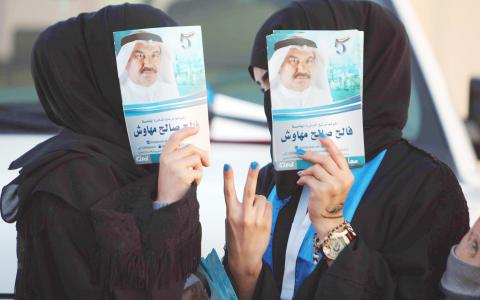The Kuwaiti opposition vowed yesterday to press on with its protests until a newly elected parliament is abolished and a disputed electoral law is scrapped, a day after a vote they boycotted.
“We will continue with our national and peaceful protests under the umbrella of the constitution to bring the downfall of the new parliament,” opposition leader and former member of parliament Faisal al-Muslim said.
“We will use all peaceful and constitutional tools, including demonstrations and gatherings,” he said.

Photo: AFP
The opposition has no representative in the 50-seat parliament after it opted to boycott Saturday’s polls to protest the government’s unilateral amendment of the key electoral law.
Under the previous law, a voter was able to choose a maximum of four candidates, which was reduced to only one in the new system.
The opposition, which held 36 seats in the 2012 dissolved parliament, has described the move as unconstitutional and says it enables the government to manipulate elections.
“We call for scrapping this parliament and the repealing of the one-vote decree because this parliament does not represent the Kuwaiti people,” Muslim said.
“The majority of the Kuwaiti people sent a direct and transparent message to the emir ... rejecting the new measures adopted by the government and calling for the new assembly to be abolished,” Muslim said.
A majority of Kuwaitis heeded opposition calls to boycott the parliamentary election on Saturday “which is evident from the fact that voter turnout was less than 27 percent,” he said.
As a result of the massive boycott, candidates from the Shiite minority won an unprecedented 17 seats, almost doubling their strength from nine seats in 2009.
Muslim said the new parliament cannot be trusted to “legislate, monitor the government actions or handle public funds.”
The Kuwaiti opposition would continue to refuse to “deal with the new parliament or the next government,” as long as the controversial law stays and the new assembly is not dissolved, Muslim said.

FORUM: The Solomon Islands’ move to bar Taiwan, the US and others from the Pacific Islands Forum has sparked criticism that Beijing’s influence was behind the decision Tuvaluan Prime Minister Feletei Teo said his country might pull out of the region’s top political meeting next month, after host nation Solomon Islands moved to block all external partners — including China, the US and Taiwan — from attending. The Pacific Islands Forum (PIF) leaders’ meeting is to be held in Honiara in September. On Thursday last week, Solomon Islands Prime Minister Jeremiah Manele told parliament that no dialogue partners would be invited to the annual gathering. Countries outside the Pacific, known as “dialogue partners,” have attended the forum since 1989, to work with Pacific leaders and contribute to discussions around

END OF AN ERA: The vote brings the curtain down on 20 years of socialist rule, which began in 2005 when Evo Morales, an indigenous coca farmer, was elected president A center-right senator and a right-wing former president are to advance to a run-off for Bolivia’s presidency after the first round of elections on Sunday, marking the end of two decades of leftist rule, preliminary official results showed. Bolivian Senator Rodrigo Paz was the surprise front-runner, with 32.15 percent of the vote cast in an election dominated by a deep economic crisis, results published by the electoral commission showed. He was followed by former Bolivian president Jorge “Tuto” Quiroga in second with 26.87 percent, according to results based on 92 percent of votes cast. Millionaire businessman Samuel Doria Medina, who had been tipped

Outside Havana, a combine belonging to a private Vietnamese company is harvesting rice, directly farming Cuban land — in a first — to help address acute food shortages in the country. The Cuban government has granted Agri VAM, a subsidiary of Vietnam’s Fujinuco Group, 1,000 hectares of arable land in Los Palacios, 118km west of the capital. Vietnam has advised Cuba on rice cultivation in the past, but this is the first time a private firm has done the farming itself. The government approved the move after a 52 percent plunge in overall agricultural production between 2018 and 2023, according to data

ELECTION DISTRACTION? When attention shifted away from the fight against the militants to politics, losses and setbacks in the battlefield increased, an analyst said Recent clashes in Somalia’s semi-autonomous Jubaland region are alarming experts, exposing cracks in the country’s federal system and creating an opening for militant group al-Shabaab to gain ground. Following years of conflict, Somalia is a loose federation of five semi-autonomous member states — Puntland, Jubaland, Galmudug, Hirshabelle and South West — that maintain often fractious relations with the central government in the capital, Mogadishu. However, ahead of elections next year, Somalia has sought to assert control over its member states, which security analysts said has created gaps for al-Shabaab infiltration. Last week, two Somalian soldiers were killed in clashes between pro-government forces and